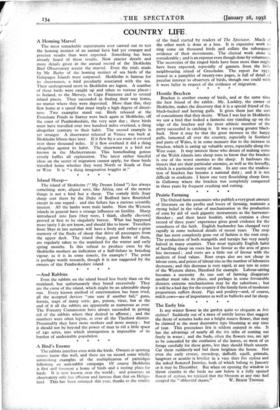Prairie Farming
The Oxford farm economists who publish a very great amount of literature on the profits and losses of farming, maintain a strong belief in the value of mechanisation in the production of corn by aid of such gigantic instruments as the harvester- thresher ; and their latest booklet, which contains a close
record of three years' experience gives good evidence for the soundness of the faith. English husbandry has changed very rapidly in some technical details of recent years. The crop that has most completely gone out of fashion is the root crop. The production of both mangolds and turnips has very nearly halved in many counties. That most typically English habit of hurdling sheep on roots has lost favour as the area of grass has increased ; and roots are a little out of favour with the analysts of food values. Root crops also are not cheap in labour costs, and prices of labour rise as the number of labourers decreases; and this decrease is very rapid, at any rate in some of the Western shires, Hereford for example. Labour-siving becomes a necessity. As one sort of farming disappears another must take its place, and perhaps in some favourable districts extreme mechanisation may be the substitute ; but it will be a bad day for the country if the family farm of moderate proportions suffers decay. Pigs and poultry—and, of course, milch cows—are of importance as well as bullocks and fat sheep.


















































 Previous page
Previous page